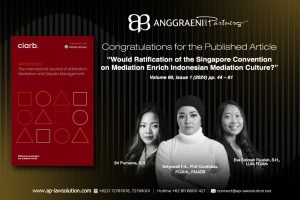Would Ratification of the Singapore Convention on Mediation Enrich Indonesian Mediation Culture?
In their groundbreaking article, “Would Ratification of the Singapore Convention on Mediation Enrich Indonesian Mediation Culture?” published in Arbitration: The International Journal of Arbitration, Mediation and Dispute Management, Setyawati Fitrianggraeni, Eva Fatimah Fauziah, and Sri Purnama explore the transformative potential of integrating the Singapore Convention on Mediation into Indonesian legal practice. This scholarly work appears in Volume 90, Issue 1, marking a pivotal moment in the evolution of dispute resolution in Indonesia.
Indonesia, with its rich tradition of valuing harmony and consensus, has always preferred mediation over more confrontational legal proceedings. However, the existing legal framework under the AADR Law of 1999 offers limited guidance on enforcing agreements from independent mediations, thus creating a gap between traditional practices and formal legal processes. The article meticulously argues that adopting the Singapore International Mediation Convention (SMC) could bridge this gap by providing clear, enforceable standards for mediated agreements, especially in international contexts.
Journal Abstract
Mediation, focusing on achieving consensus, generally aligns with Indonesia’s inclination towards amicable dispute resolution steeped in the nation’s cultural heritage. It offers a non-adversarial avenue for dispute resolution, steering Indonesian parties away from protracted and complex court or arbitration processes. This avoidance of unnecessary delay and complexity is not only a requirement before a defence submission in court, but is also encouraged in arbitrations, such as those under BANI Rules. However, Indonesia’s Law Number 30 of 1999 on Arbitration and Alternative Dispute Resolution (AADR Law) barely scratches the surface and provides limited clarity on enforcing mediated settlement agreements, particularly those resulting from independent mediations. This article seeks to explore how agreements resulting from mediation are enforced under the existing Indonesian legal framework and to evaluate whether the Singapore International Mediation Convention (SMC) would enrich the current mediation practices and enforcement mechanisms in Indonesia.
Keywords
mediation in Indonesia, enforcement of settlement agreements resulting from mediation abroad in Indonesia, Singapore International Mediation Convention (SMC), Alternative Dispute Resolution, Indonesia, Cross-Border Mediation, International Arbitration and Mediation Standards, Legal Framework for Mediation in Indonesia
Anggraeni & Partners proudly recognize the contributions of these authors, who have not only advanced academic understanding but also proposed practical solutions to enhance Indonesia’s legal landscape.
If you are interested to read the full article, kindly please visit Kluwerlawonline at this link
For further information, please contact:
P: 6221. 7278 7678, 72795001
H: +62 811 8800 427
Anggraeni and Partners, an Indonesian law practice with a worldwide vision, provides comprehensive legal solutions using forward-thinking strategies. We help clients manage legal risk and resolve disputes on admiralty and maritime law, complicated energy and commercial issues, arbitration and litigation, tortious claims handling, and cyber tech law
S.F. Anggraeni
Managing Partner
Eva F Fauziah
Senior Associate Practice Group International Arbitration and Litigation and Head of Legal Lab.
Sri Purnama
Junior Legal Research Analyst

